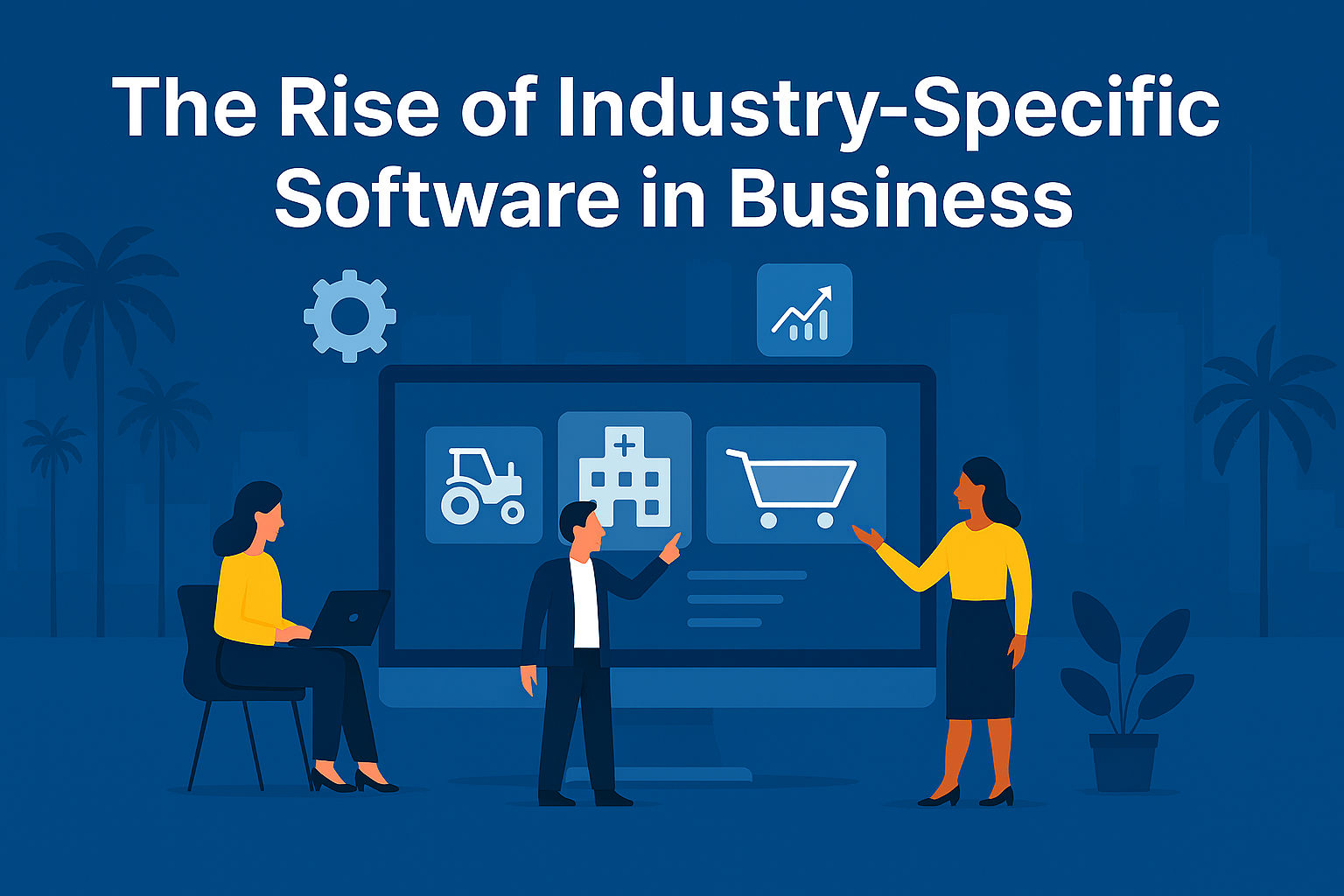Technology has really grown over the years. It’s no longer about basic, one-size-fits-all solutions. Today, companies want software that understands their industry and supports their unique operational needs. This shift has led to the rise of industry-specific software, built to match specific workflows, regulatory requirements, and business models.
In this article, I am going to discuss the increasing trend of industry-specific software, how it is affecting different industries, why it is heading in that direction at this point, and how companies can benefit from having such specific solutions.
Why the Rise of Industry-Specific Software Is Occurring
The growth of industry-specific software is because of some significant developments in the corporate world and technology. Therefore, that shift is happening:
1. Generic Software Is Not for Everyone
Not all businesses are the same. Industry-specific software does not typically yield in industry-specific operations. That is why increasing numbers of businesses are looking for industry-focused software that fits their workflow and enables them to work faster and less erroneously.
2. Regulation Is a Big Problem
Finance, healthcare, and education are sectors that are regulated closely. Industry-specialized software is programmed in compliance with the regulations, keeping the firms in check and avoiding expensive lawsuits.
3. Staff Learn More Quickly
Software emulating the industry norm job and language hastens teams to learn it much faster. It reduces training time, improves accuracy, and lets staff spend more time doing their main business rather than struggling with a one-size-fits-all interface.
4. Better Data, Better Decisions
Industry-focused software provides insights that matter. Instead of being overwhelmed by unnecessary metrics, decision-makers are provided with reports and dashboards based on the actual needs of their industry and hence react faster and wiser.
5. Seamless Integration
The majority of industries have already acquired industry-specific tools. Industrial-based software must be easier to integrate with others with fewer data silos and less manual labor. Such integration will more effectively result in efficiency with an excellent tech ecosystem.
Industries Utilizing Industry-Specific Software
More and more industries are now making use of industry-focused software to carry out activities with minimal human intervention and to overcome issues that plague industries. These are the means in which various industries make use of these tools:
1. Health
Industry-specific software for the healthcare industry aids patient care and regulatory compliance issues. Some of the commonly used tools are:
- Electronic Health Records (EHR)
- Patient and appointment management systems
- HIPAA-enabled communication platforms
These assist providers in maintaining confidential information in a safe location and maximize operational effectiveness.
2. Retail and eCommerce
Retailers are embracing real-time data, personalization, and inventory accuracy-enabled solutions. Common features are:
- Inventory tracking and supply chain
- Loyalty and rewards program management
- Customer behavior analysis
These technologies enable companies to provide enhanced customer experience and smart sales practices.
3. Education
Digital solutions form the foundation of schools for effective learning processes. Most crucial platforms are:
- Learning Management Systems (LMS)
- Online test and assessment systems
- Student data analysis
These products enable virtual classrooms, performance monitoring, and customized learning streams.
4. Construction
Construction companies appreciate software that facilitates project management and compliance. Most commonly utilized categories of software are:
- Blueprint and document sharing software
- Applications for on-site inspection and reports
- Budgeting and scheduling applications for projects
These assist in simple coordination of teams and prevention of delay or errors that are expensive.
5. Manufacturing
Manufacturing process and supply chain management software is application-specific by which the manufacturers utilize it. The most prevalent software functionality includes:
- Production planning and scheduling programs
- Compliance and quality control programs
- Equipment monitoring and maintenance programs
These help in obtaining maximum from the resources and preventing downtime.
6. Real Estate
Real estate agents find software to handle listings, pursue leads, and close deals more efficiently. Typical functionality is:
- Property listing and CRM solutions
- Virtual tour and document transfer feature
- Client calendar-based appointment scheduling
This solution allows the agents and brokers to foster service and competition.
Issues to Keep in Mind Before Deployment
There are many benefits, but the company must also consider issues:
- Vendor Lock-In: Having a single vendor can limit flexibility. Always have an exit strategy or a scalability plan.
- Higher Upfront Price Tag: Specialized platforms or specialized applications could be higher to create or purchase initially. But the Return on Investment will regain this difference in the long run.
- Integration Issues: Existing tools and applications will not necessarily integrate well with new software. Verify compatibility beforehand before committing.
Steps Towards Choosing the Right Industry-Specific Software
Prior to making a decision, companies should have a clear-cut process:
1. Identification of Pain Points
Begin with a clear understanding of where the off-the-shelf software is not making a difference. Identify points of inefficiency, lethargy, or non-compliance.
2. Stakeholder Consultation
Obtain inputs from employees who will be utilizing the software daily. Their feedback can be utilized to develop the proper list of requirements.
3. Consider Custom versus Off-the-Shelf Solutions
Choose to build custom solutions or buy what you already have available, namely business-specific to your company. To others, hiring Florida software development companies can offer them local presence and level of customization that they require.
4. Test Before You Buy
Buy demos, pilot projects, and verify references before you sign on the dotted line.
Future Industry-Specific Software Trends
Industry-specific software's horizon is far away. The software will be influenced by these trends most likely:
- AI and Machine Learning Integration: Increasingly, industries will have predictive analytics and industry-specific smart automation.
- Cloud-Based Delivery: SaaS systems will continue to expand, with flexibility and cost-effective options for all-sized businesses.
- Vertical SaaS Platforms: Contrary to extensive-gauge SaaS applications, vertical SaaS will cater only to niche markets, offering even greater specialization and customization.
👉Suggested Read: Technologies Shaping the Future of Software Product Development
Conclusion
Industry-specific software development is symptomatic of the way in which firms are specializing, streamlining, and optimizing their operations. From retail and healthcare to construction and education, all sectors are discovering the value of software designed specifically for their needs. By solving customized workflows, increasing compliance, and raising productivity, such software is revolutionizing the way industries function at each stage.
For those companies that want to go digital, research of software that's industry-specific could be the way to go. It's not always a battle of competing. It's about having smarter, more resilient operations in years to come.

